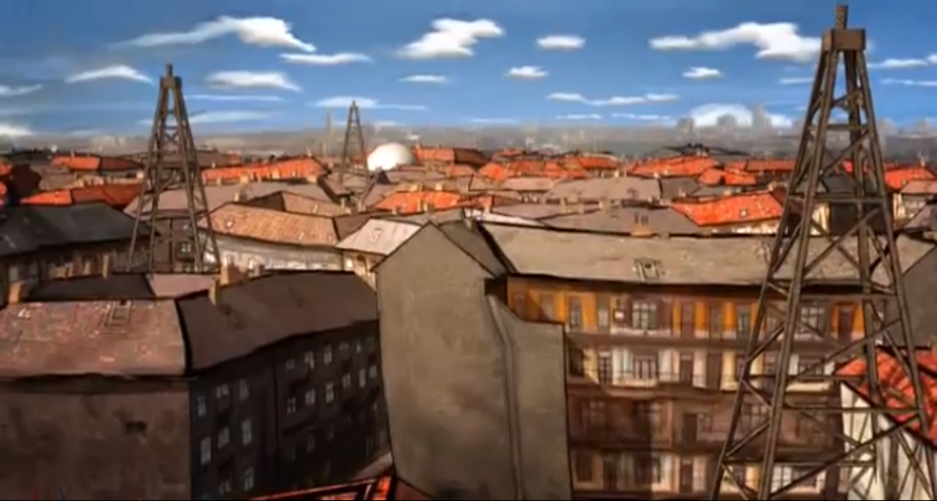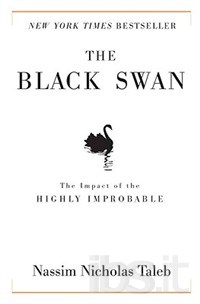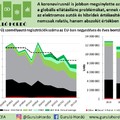Steak for breakfast, Euro referendum in Germany, China turning green or hostile, the Next Big Thing after Google, Hungary finally finding its windfall.
By Diána Szőke, Péter Simon Vargha and István Zsoldos
This is the year-end, and this is the season for predictions, often silly and speculative ones. Here we present “black swan” type speculations for 2013 (and a bit beyond) that may not be very likely, but would be momentous if happened, and their possibility is generally overlooked.
Black swans are rare and unpredictable events with extreme impact, but for which humans have a tendency to find simplistic explanations, making them look almost inevitable in retrospect. The phrase was coined and a whole theory around it was elaborated by Nassim Taleb in his book titled The Black Swan: The Impact of the Highly Improbable, a bestseller in 2007. See e.g. in the Wikipedia.
We present a mix of “good” and “bad” scenarios, but of course what is positive and what is negative often depends on the time frame and for whom we evaluate the changes.
We give a detailed description of the hypothetical black swan event, which (as we know from behavioral economics) makes it more plausible sounding - but actually less likely to happen in the exact way described.
We invite you to rate how probable these black swans are. To give it a twist you might also try and guess which black swan the others will choose as the most probable (hence the title beauty contest). We have put our own guesses in a sealed envelope and put it in a safe and will compare it with the results.
New Chinese leadership turns green, develops super-batteries through X-prize style competition
Scenario: During heavy winter smog, pictures of newborn Chinese babies with severe lung weakness due to air pollution flood Sina Weibo, China’s largest microblog. The new leadership fears losing political control and turns green. Premier Le Keqiang lets it be known that his father was an asthma sufferer. He says that “The People’s Republic is serious about this. We will eliminate coal use in power plants and replace it with gas in 10 years.” An 88 million yuan government competition for designing a super-battery is unexpectedly won by three Indian IT geeks with little previous training in chemistry. China tries to keep the battery technology for itself, but in an ironic turn of events, a US private company with government backing reverse-engineers it.
![china-polluted-chinese-city-smog[1].jpg](https://m.blog.hu/gu/gurulohordo/image/china-polluted-chinese-city-smog%5B1%5D.jpg) Source: http://www.china-mike.com
Source: http://www.china-mike.com
Consequences: Market based gas prices jump. The news of the super cheap battery (suitable for cars) leads to an oil price collapse to below 40 dollars and a revolution in Saudi Arabia. Producers outside China would initially use coal to satisfy higher electricity demand – gas is suddenly too expensive, nuclear too slow, renewables too unreliable. Coal use would partially shift from China to abroad but decline in the longer run. The transition to gas results in a significant decrease in global CO2 emissions.
Unconventionals lead to OPEC breakup
Scenario: The increasing unconventional oil production in the US (and some finds outside North America) starts to dent oil prices. OPEC countries struggle to maintain their level of public spending. The agreed OPEC production quota cuts become ineffective, because all members cheat and produce more to keep social tensions at bay. Saudi Arabia eventually gets fed up with this (and needs the money itself), and floods the market with oil (much as it did in the 80’s).
![US-Embassy-demonstration[1].jpg](https://m.blog.hu/gu/gurulohordo/image/US-Embassy-demonstration%5B1%5D.jpg) Source: http://www.ethicaloil.org
Source: http://www.ethicaloil.org
Consequences: Oil prices decrease to below 50 dollars / barrel for years. This halts investments into alternatives to oil and more efficient consumption – oil remains the prominent fuel of choice for the next decades. Oil exporting country regimes further destabilize, which leads to high oil price volatility.
Extreme weather destroys half of the grain harvest, governments convert people first to meat-eating then to vegetarianism
Scenario: The “Year Without Rain” in the northern hemisphere and the severe floods in the tropics result in a widespread failure of grain harvests, reducing global output by 50%. Climate change is blamed. Several large exporters ban exports, including Argentina, Russia and France. The OECD proposes to set up a “Strategic Grain Reserve” in neutral Antarctica. France proposes to spend more on EU agricultural subsidies. Many developing countries face famine, riots and revolutions.
![Steak-Egg-Cheese-McDonalds-Breakfast[1].jpg](https://m.blog.hu/gu/gurulohordo/image/Steak-Egg-Cheese-McDonalds-Breakfast%5B1%5D.jpg)
Source: http://grubgrade.com
Consequences: There is a widespread conversion of animal feedstock to human food, which leads to a temporary oversupply of slaughtered animals. Texas coins the “Steak for Breakfast Too“ slogan, but later on governments try to convert the population to vegetarianism, to cope with the reduced supply of food (producing meat requires more calories). Research into plant based and other meat substitutes is accelerated. California introduces meat taxes and tofu subsidies. Bangladesh has a military regime, with the main task of distributing food rations.
Kasparov president in Russia
Scenario: The killing of a journalist investigating offshore accounts of key figures of the regime in Russia leads to mass protests organized via social sites. Following bloodsheds some leaders start to defect, including PM Medvedev and Gazprom chief Miller. An early election is won by an allied opposition, Kasparov becomes president. Energy markets are liberalized, and the intense competition undercuts Gazprom’s position. Finally the company bows to increasing pressures and agrees to sell gas at prices linked to Western European hub prices to Europe. This is also part of the deal in the EU-Russia Association Agreement.
 Source: peaceloveapplepie.com
Source: peaceloveapplepie.com
Consequences: An opening up of Russia’s economy and the energy sector draws in much more foreign capital while the role of oligopolies shrinks, boosting growth. As a result oil and gas supply increases, putting some downward pressure on prices. But at the same time the reliance on Russian gas becomes a more favorable option for Europe, increasing demand.
Euro referendum in Germany leads to the Eurozone falling apart
Scenario: The Free Democrat Party in Germany is desperate before the autumn general elections, and decides to run on a ticket calling for a referendum on whether to stay inside the Euro. Angela Merkel first resists the idea, calling the move “populist”, but feels the general mood and comes around. She says: “If we are back in government, we want to give people a say in this. Not that we oppose the Euro, but there should be an open debate about this matter and it be closed once and for all.”
![anti-euro-camp-frankfurt-germany[1].jpg](https://m.blog.hu/gu/gurulohordo/image/anti-euro-camp-frankfurt-germany%5B1%5D.jpg) Source: http://antieuroprotest.wordpress.com
Source: http://antieuroprotest.wordpress.com
Consequences: The Euro collapses immediately in price, and very likely would de facto cease to exist within a few months. The markets would suspect that Germans would indeed vote for a new Deutsche Mark, and no one would buy Italian or Spanish government debt any more. No amount of official assurances or backtracking would calm markets, only an immediate fiscal union would hold the Eurozone together – which would remain impossible.
“Persian Spring” in Iran
Scenario: In the run-up to the Israeli general elections, Prime Minister Netanjahu promises to “take all military means necessary” against Iran. The Iranian leadership, fearing an Israeli strike against its nuclear facilities, makes good on its threat of closing the Strait of Hormuz. But its plan backfires: the pressures of the embargo, combined with the complete loss of oil revenues, makes food prices skyrocket. Protests start in rural areas during Nowruz (Iranian new year) celebrations in March, and quickly spread to major cities. The regime is overthrown by a secular revolution inspired by the “Arab Spring”.
![capt.photo_1244860564233-1-0[1].jpg](https://m.blog.hu/gu/gurulohordo/image/capt.photo_1244860564233-1-0%5B1%5D.jpg) Source: http://www.radosh.net
Source: http://www.radosh.net
Consequences: The emergence of a secular Iranian leadership results in a diplomatic opening, sanctions are dropped, and oil production quickly reaches pre-embargo levels. The IEA revises its 2035 Iranian oil supply forecast to triple of its previous estimate. The prospect of a sudden abundance of Iranian gas supply leads to talk of a “Greater Nabucco” gas pipeline to Europe, while China invests in LNG terminals along Iran’s southern coastline.
Quine, the next Google builds brain-driven audiovisual tool
Scenario: A small US startup, Quine, launched by a neuroscience student and a computer game geek creates a virtual audiovisual communication system linked directly to the brain. The first application is a successful 3D game, but then another application revolutionizes communication as using the system gives a near perfect illusion of talking to someone in person.
![emotiv_interface[1].jpg](https://m.blog.hu/gu/gurulohordo/image/emotiv_interface%5B1%5D.jpg) Source: http://nextbigfuture.com
Source: http://nextbigfuture.com
Consequences: The spread of the system causes a massive decline in personal transportation needs in a few years, reducing transport energy demand. It also brings massive changes in labor markets: home office and remote jobs become a commonplace. Education systems are affected as well: national systems give way to a few big international networks.
US-China trade war leads to bond stand-off
Scenario: A recession in China leads to a sharp devaluation of the yuan. The US government retaliates by branding China a currency manipulator. The two countries get bogged down in a tit-for-tat trade war, drawing Japan in after the Chinese navy lands on the Senkaku / Diaoyu islands. China starts to sell its vast US government bond holdings in “Operation No Price Too Low”.
![sad_guy_5[1].png](https://m.blog.hu/gu/gurulohordo/image/sad_guy_5%5B1%5D.png) Source: http://bigpicture.typepad.com
Source: http://bigpicture.typepad.com
Consequences: The US Congress adopts the “Enemy State Bond Holder Act”, which declares any government obligation to designated enemy states null and void. The resulting uncertainty leads to a steep drop in rich country bond prices in general, especially after it leaks that Italy is considering similar laws, but with a wider definition of “enemy states” that may potentially include Germany. The IMF steps in to negotiate the multilateral “Bond Holiday Agreement”, but in the meantime most rich countries rely on forced savings and money printing to (re)finance their governments. At a private dinner, President Obama is taped making remarks suggesting a return to the gold standard.
Huge unconventional oil find in Hungary
Scenario: The unconventional oil extraction technology (hydraulic fracturing and horizontal drilling) that has changed the US energy picture is adapted to work in Józsefváros (a district of Budapest). The oil windfall is so huge that politicians start to talk about an ‘Energy independence in Hungary 2020’ program, while the Friendship pipeline is adjusted to accommodate a reverse flow towards Ukraine. The government offers to lend money to the IMF and increases pensions by 2/3.
 Drilling in Budapest.
Drilling in Budapest.
Source: Nyócker - the movie (Youtube)
Consequences: Hungary finally finds the windfall it has been desperately looking for in the last couple of years, boosting government finances, the local economy and employment. Sorry to ruin the party, but the oil find would not lead to a major reduction in fuel prices: those are determined by a global oil market (and state excise taxes). That is of course unless politics intervenes to spend the windfall on subsidizing gasoline consumption and curbing oil exports…
A bejegyzés trackback címe:
Kommentek:
A hozzászólások a vonatkozó jogszabályok értelmében felhasználói tartalomnak minősülnek, értük a szolgáltatás technikai üzemeltetője semmilyen felelősséget nem vállal, azokat nem ellenőrzi. Kifogás esetén forduljon a blog szerkesztőjéhez. Részletek a Felhasználási feltételekben és az adatvédelmi tájékoztatóban.





